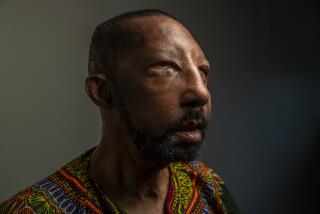Finley Is a Medical Marvel
- Share via
Joshua Finley doesn’t need to read the New England Journal of Medicine or watch an episode of “ER” to understand the miracles of modern medicine.
The six-inch scar on the right side of his stomach is a clue to what Dr. Robert Ettenger, chief of staff at UCLA Medical Center, calls “an amazing story.”
Finley was the recipient of breakthroughs in drugs and surgery procedures, leading to a successful kidney transplant when he was 12.
It has enabled him to live a normal life, which includes hitting a City Section-leading 10 home runs this season as a junior outfielder for Los Angeles High.
“You would not really think it was possible for these kids to be elite athletes,” Ettenger said.
Finley was diagnosed at birth as having Eagle-Barrett syndrome, an ailment that leaves the abdominal muscles weak and damages the urinary tract. Doctors warned he might need a new kidney by the time he reached puberty.
In 2001, a blood test revealed Finley’s creatinine level was abnormally high, an indicator of kidney malfunction. Doctors told his parents that the time had come for a transplant.
“That was devastating,” Finley’s mother, Linda, said.
The kidneys are vital organs that clean toxins from the blood. Finley didn’t immediately sense the seriousness of his situation because he had no dire symptoms and wasn’t on dialysis, during which a machine is used to take over the function of removing wastes.
“Everything happened so fast,” he said.
Finley continued playing park-league baseball up to three days before his surgery on Aug. 8, 2001.
The most important development in clearing the way for the transplant was finding a donor.
There are more than 88,000 patients waiting for organ transplants, according to the United Network for Organ Sharing.
Linda and her husband, Steve, remember going in for a doctor’s consultation and being told their kidneys weren’t a match.
“I said, ‘Oh, Lord, now what?’ ” Linda recalled.
They returned home and the phone rang. One of Linda’s two nephews was calling to say hello. She hadn’t talked with either nephew in two years and didn’t know where they were living.
Suddenly, out of the blue, her prayers had been answered. She would seek their help in making a kidney donation no matter how uncomfortable she felt.
“How do you ask somebody to give a kidney?” Linda said. “It’s not the same like asking for a loan. Once given, it’s gone.”
The older nephew, 21-year-old Jeremy Lanier, agreed to give one of his kidneys, and tests determined he was a match.
“Joshua was one of my favorite cousins since he was a baby,” Lanier said. “It was a no-brainer.”
Doctors used a laparoscopic procedure to remove Lanier’s kidney and transplanted it into Finley, leaving the two non-functioning kidneys in his body.
“Three kidneys -- that’s creepy when you think about it,” Finley said.
Finley benefited from advances in anti-rejection drugs at UCLA. He experienced fewer side effects and now takes only five pills in the morning and five more at night, far fewer than previous transplant patients took to prevent organ rejection.
“If I was living in an earlier era, I would probably be dead,” Finley said. “It taught me how fortunate I was.”
At 5 feet 10 and 170 pounds, Finley used the weight room to improve his strength and build up his abdominal muscles. His home-run production has been a pleasant surprise in his first season of varsity baseball.
“Honestly, I have no idea [where it has come from], but it’s perfect timing,” he said.
His success in high school baseball should give inspiration to those who come up through the recreation and parks program. That’s where Finley has played most of his life because his father is the director of Hollywood Recreation Center.
Ettenger, who met Finley as a seventh-grader at UCLA Medical Center, calls him the “Alonzo Mourning of high school baseball,” referring to the NBA center who had a kidney transplant.
Ettenger said there were two important lessons from Finley’s experience.
“No. 1, the sky’s the limit for children,” he said. “And second, we have a need for kidney donors and organ donors, so we can get other kids to do this.”
Steve Finley says he wants “kids to know they can overcome anything.”
And Joshua Finley offers another lesson. “I learned the importance of life,” he said.
Eric Sondheimer can be reached at eric.sondheimer@latimes.com







